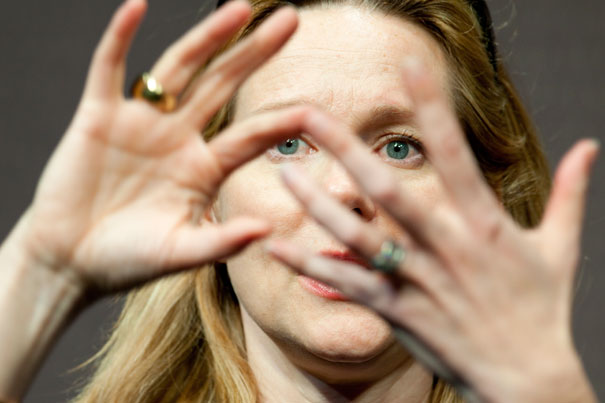Arts & Culture
-

Live fast, die young, inspire Shakespeare
Stephen Greenblatt finds a tragic strain in the life and work of Christopher Marlowe
-

Steve McQueen could lecture you, but he’s got other plans
‘I think the audience needs more, and I feel I need to give more,’ says award-winning filmmaker — presenter of this year’s Norton talks
-

Marking 100 years of Norton Lectures
Panelists reflect on ‘incredible value’ of annual series as ‘megaphone’ for artists and scholars
-
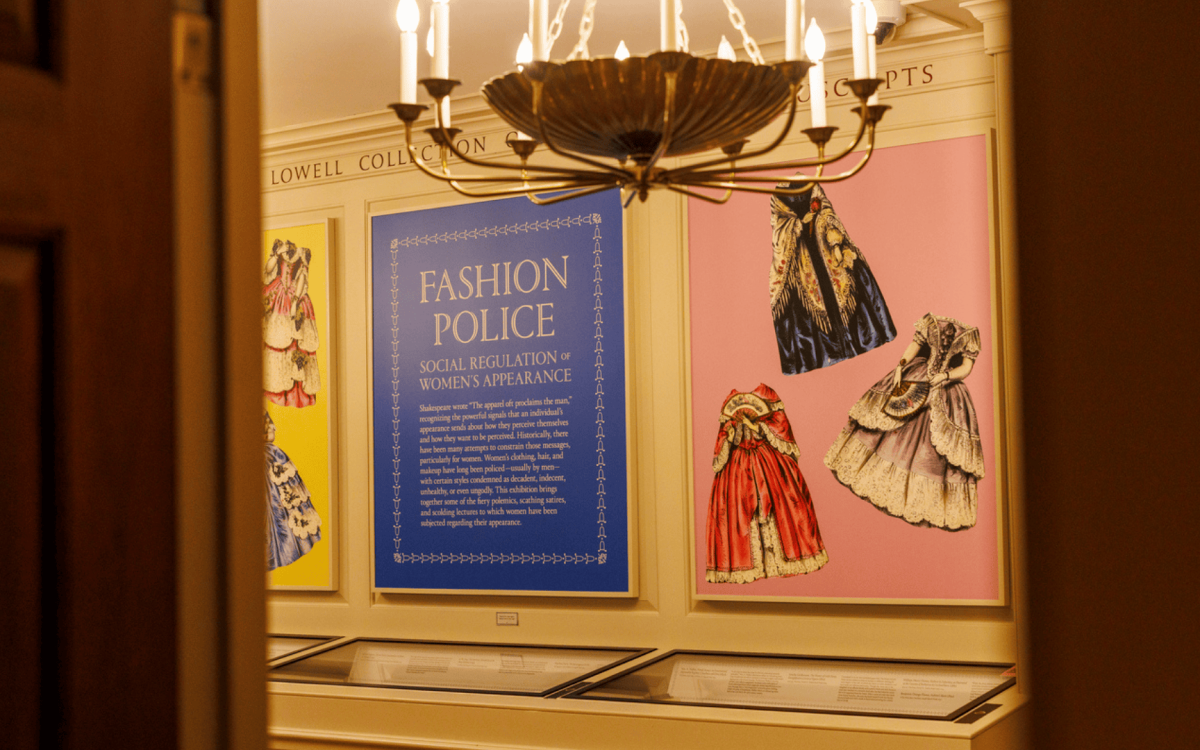
How fashion police have been walking beat for centuries
Houghton Library exhibit highlights the policing of women’s fashion since the 17th century.
-
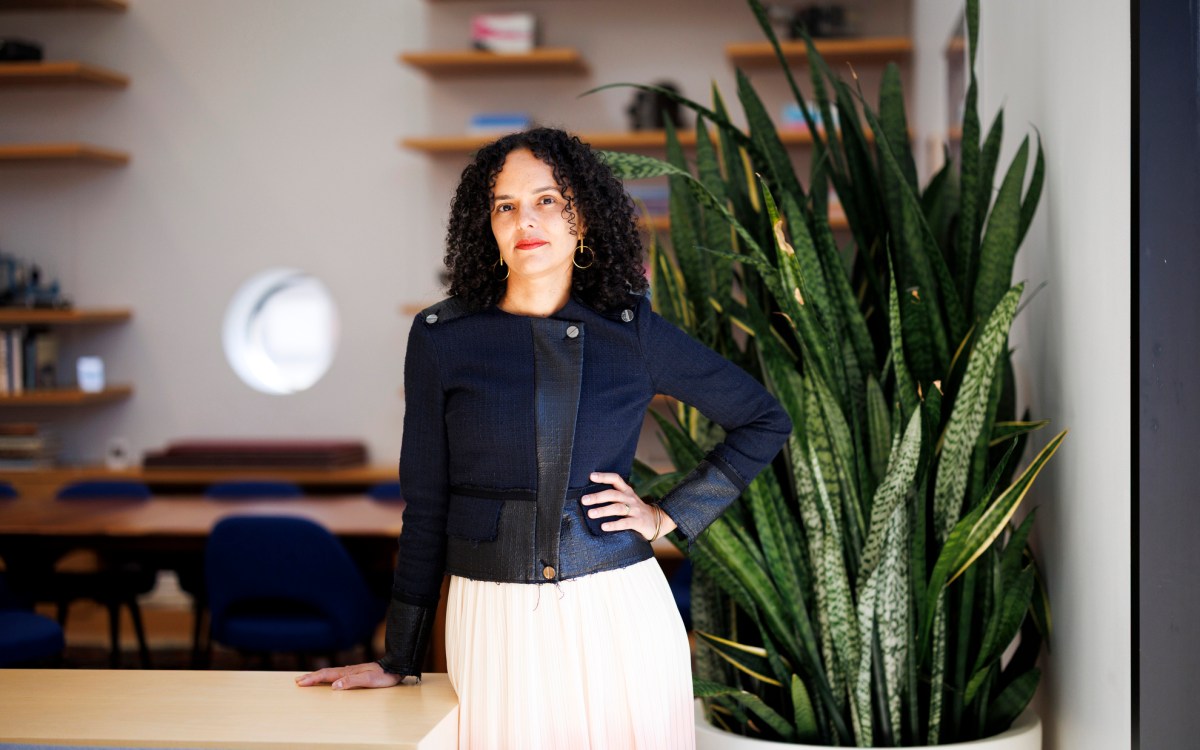
Seeing what you see
New faculty Cécile Fromont is a visual problem solver
-
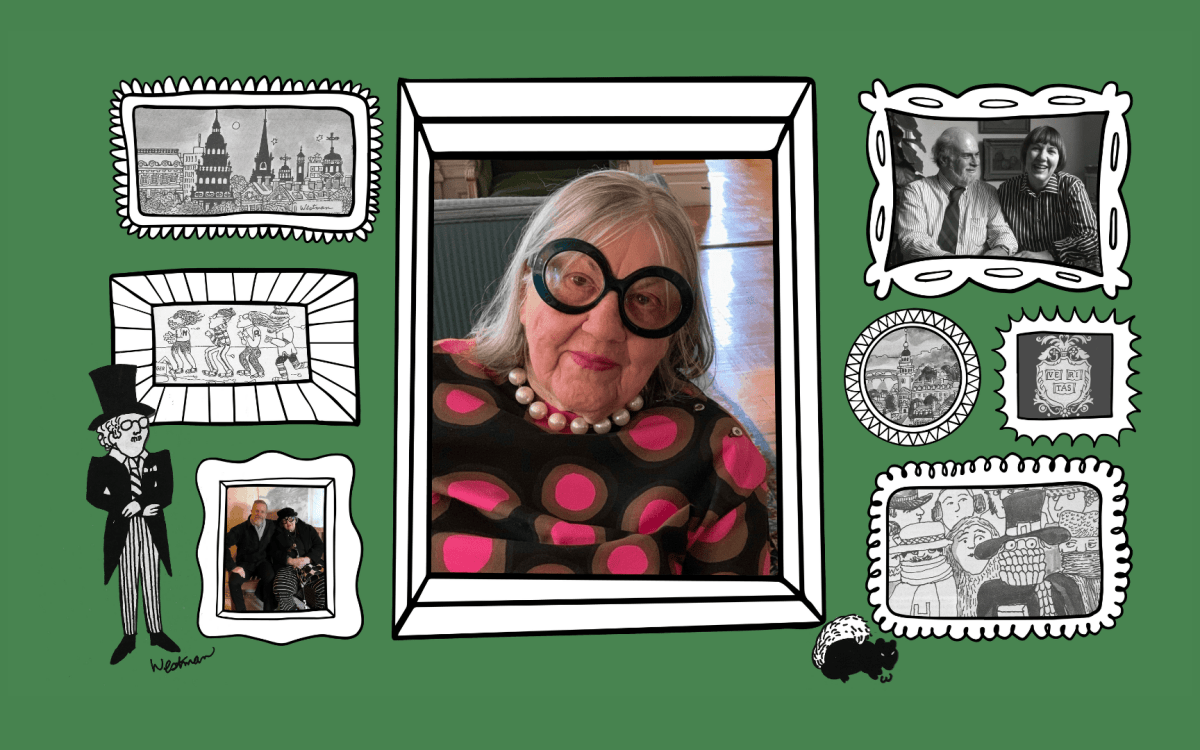
Her Cambridge iconography made her a local icon
Before New Yorker covers, Barbara Westman created colorful visions of campus as Gazette’s first staff artist
-
A theology of culture
Philosopher Paul Tillich once denied there was a gap between religion and culture. Today, he might reach for another convergent ideal: utopia.
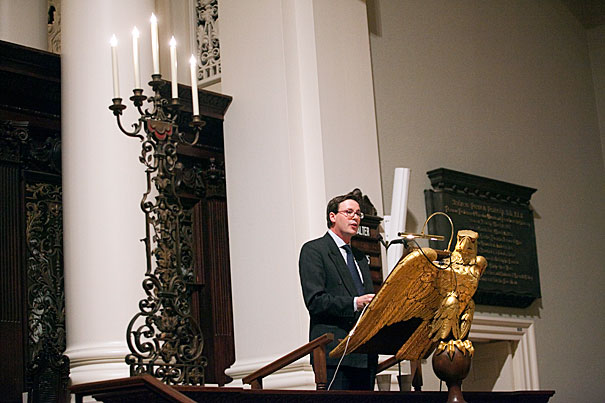
-
Thinking local
On a visit to Harvard, an African architect imparts a Third World lesson: more for less.
-
Scaling up, and down
Harvard physicist Lisa Randall helped to develop an offbeat new show at the Carpenter Center that explores the concept of size, through scientific and artistic lenses

-
Exploring Happiness: From Aristotle to Brain Science
Happiness — how do we get it, how do we keep it, and where does it come from? Distinguished visiting fellow Sissela Bok plumbs the theories of philosophers, neuroscientists, and other specialists, and synthesizes her research into a comprehensive overview of the subject.
-
Republic, Lost: How Money Corrupts Congress — and a Plan to Stop It
Lawrence Lessig, the Roy L. Furman Professor of Law, presents a road map for how to get the U.S. Congress back on track, and examines the issues of campaign financing, corporate lobbying, and other outside monetary interests that derail the government.
-
On the side of the angels
In his latest book, psychologist and linguist Steven Pinker cites data to show that the world is becoming far more peaceful than you might have thought.
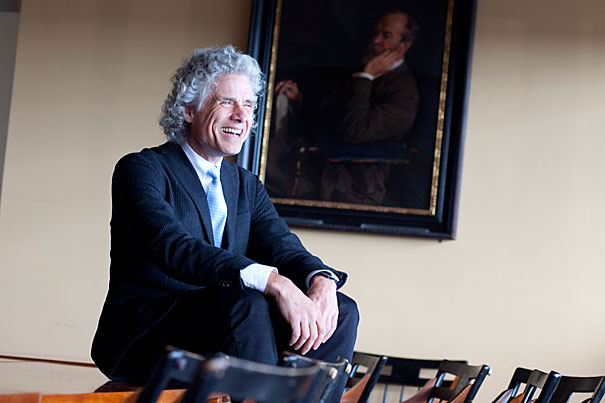
-
The New Harvest: Agricultural Innovation in Africa
Professor of the Practice of International Development at Harvard Kennedy School Calestous Juma presents three opportunities that can transform African agriculture: advances in science and technology; the creation of regional markets; and the emergence of entrepreneurial leaders dedicated to the continent’s economic improvement.
-
Treasure island
Houghton Library illustrates how the stuff of great literature is conserved, from the first jumbled box to the final neat archive.
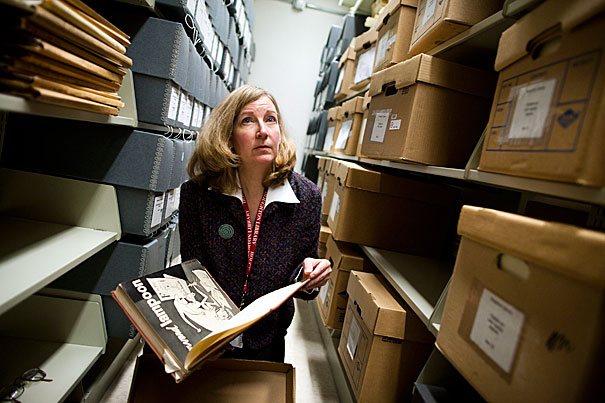
-
The history at Houghton
Houghton, a template for university literary archives everywhere, also has room for the odd: A Thoreau pencil, a Dickinson teacup, and more.
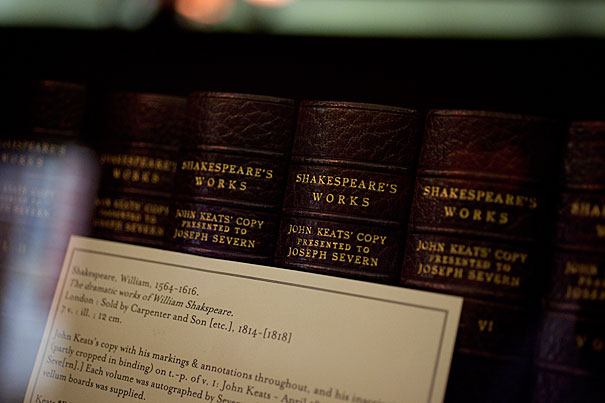
-
Creative force
Leaders in the growing field of artist-endowed foundations discussed the challenges and goals of their work in a panel talk at the Sackler Museum.
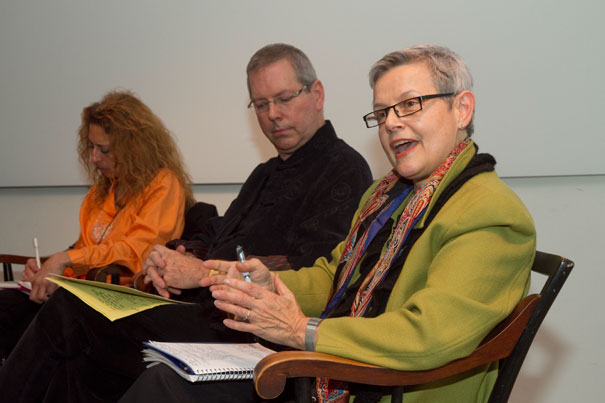
-
An artist who disrupted convention
Artists and scholars gathered at the Arthur M. Sackler Museum Nov. 3 for a panel discussion on the work of 20th-century artist Romare Bearden. The event celebrated “Color and Construction: The Intimate Vision of Romare Bearden,” which runs through Dec. 9.
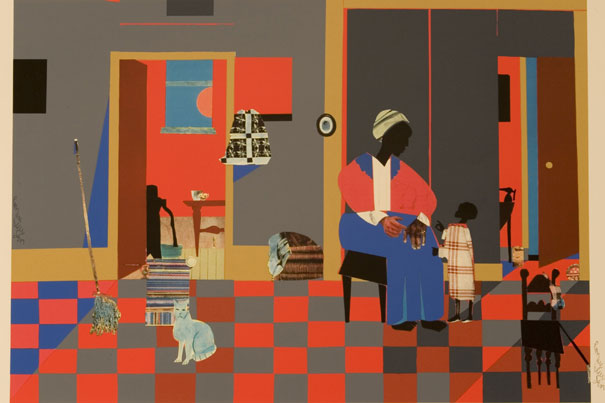
-
Lang Lang lends his ear to Harvard
As part of the Office for the Arts at Harvard’s Learning From Performers program, piano virtuoso Lang Lang gave a master class to three lucky Harvard undergraduates at Sanders Theatre.
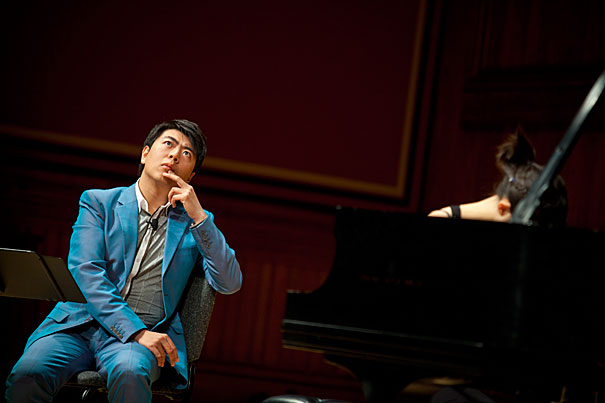
-
Through artistry, toleration
“On the Nature of Things,” a poem written 2,000 years ago that flouted many mainstream concepts, helped the Western world to ease into modernity, author Stephen Greenblatt recounted.
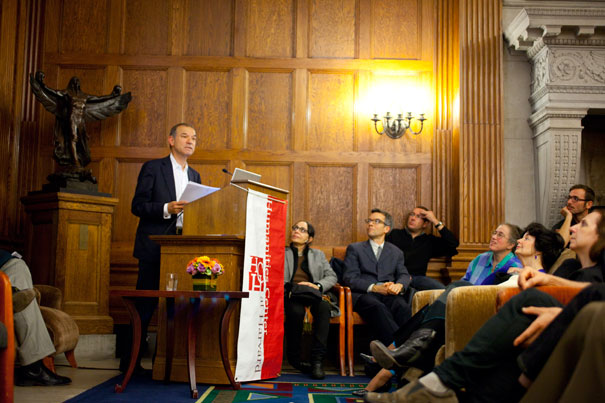
-
Settling scores
The famously detailed scores of conductor Sir Georg Solti will now live at Harvard’s Loeb Music Library — and soon on the Web. A reception celebrated a new exhibit of his work, as well as the visit of Solti’s widow and the collection’s donor, Lady Solti.

-
The Harvard Sampler: Liberal Education for the Twenty-First Century
Edited by three Harvard faculty members, including Dean of Harvard College Evelynn M. Hammonds, and featuring essays by University faculty including Jonathan Losos, Steven Pinker, Werner Sollors, and others, this collection of essays offers insight into contemporary education and issues in academia.
-
The line that defines
A new book by Rachel St. John unearths the colorful history of the 2,000-mile U.S. border with Mexico.

-
The Copan Sculpture Museum: Ancient Maya Artistry in Stucco and Stone
With illustrations and archaeological context, Barbara Fash, director of the Corpus of Maya Hieroglyphic Inscriptions Program at the Peabody Museum, discusses the global significance of a Honduran museum dedicated to the ancient Maya stone carvings in Copan.
-
The Swerve: How the World Became Modern
In this wave-making book, Cogan University Professor Stephen Greenblatt takes into account “On the Nature of Things,” an eerily modern poem by the ancient Roman writer Lucretius, which helped shape the great thinkers of the Renaissance, even if fewer than three copies of the poem were known to exist at the time.
-
A magic wand for artists’ dreams
With an annual program administered by the Office for the Arts, Harvard undergraduates explore extraordinary opportunities for growth in their fields.

-
Enduring inspiration
Richard Olivier, son of famed actor Sir Laurence Olivier, used Shakespeare’s “Henry V” to teach Harvard students about the role of identity in conflict in Sever Hall Oct. 24. The presentation was part of “Negotiation and Conflict Management,” a course that focuses on the emotional and identity-based aspects of conflict that often confound easy resolution.
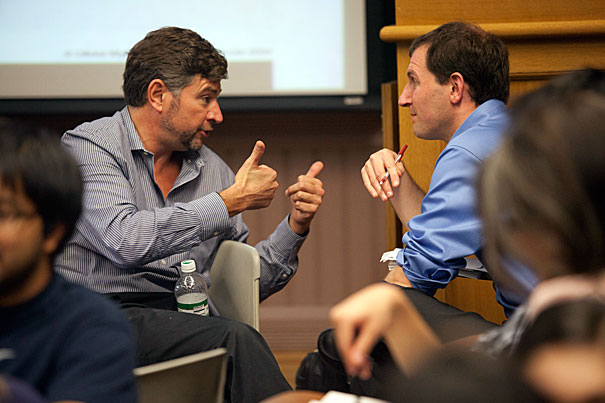
-
‘The Creation of Mather’
In celebration of the creation of Mather House some 40 years ago, Co-Masters Christie McDonald and Michael Rosengarten have organized a retrospective exhibit of the House’s design and construction in the Sandra Naddaff and Leigh Hafrey Three Columns Gallery.
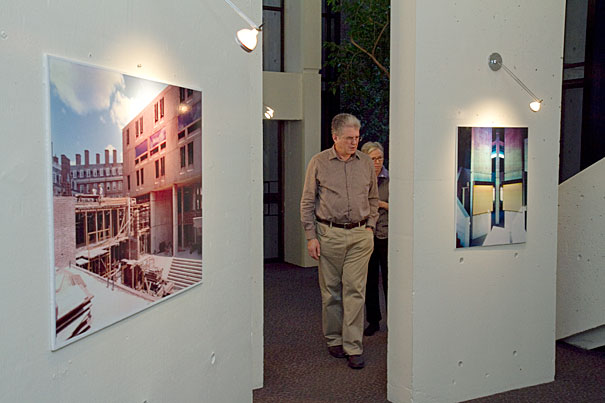
-
Harvard, then and now
Published to commemorate Harvard’s 375th anniversary, “Explore Harvard,” a collection of contemporary and historical photographs, showcases the myriad intellectual exchanges that make the University a citadel of learning.
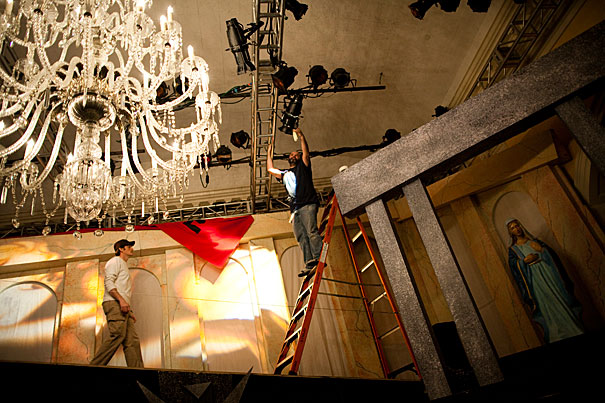
-
Harvard’s year of exile
It’s little known, but Harvard wasn’t always in Cambridge. During the American Revolution, the College temporarily turned its campus over to the new colonial army, and moved inland to Concord.
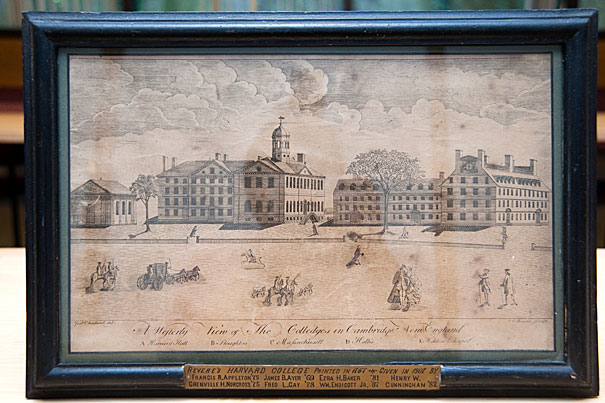
-
Rethinking the Classics
David F. Elmer Assistant Professor of the Classics, Faculty of Arts and Sciences
-
The Power of Theater
Diane Paulus Artistic Director, American Repertory Theater Professor of the Practice of Theater, Faculty of Arts and Sciences
-
Literary Luminaries
James R. Russell Mashtots Professor of Armenian Studies, Faculty of Arts and Sciences
-
Revolutionizing Egyptology
Peter Der Manuelian Philip J. King Professor of Egyptology, Faculty of Arts and Sciences
-
Memories of Armageddon
With haunting images, Japanese artist and survivor Junko Kayashige depicts the horrors of the bombings of Hiroshima and Nagasaki in an exhibition of oil paintings on view at the Harvard Graduate School of Education’s Monroe C. Gutman Library.
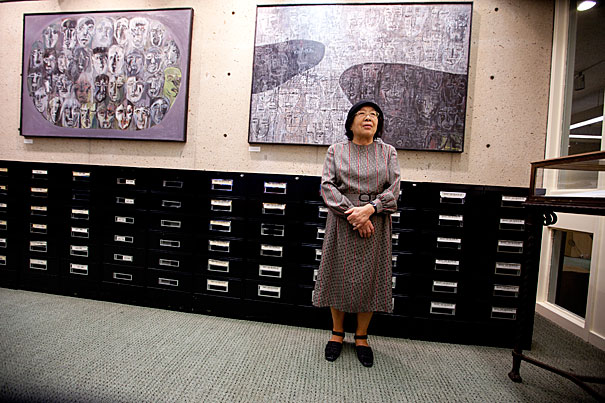
-
Poetry in the Yard
Homi K. Bhabha, the Anne F. Rothenberg Professor of the Humanities and the Director of the Mahindra Humanities Center, discusses his remembrance of September 11. Professor Bhabha’s project reflects on the decade since the tragedy through a series of poems installed within Harvard Yard.
-
Learning from Linney
Actress Laura Linney provided insights on her work — and on acting in general — for 100 members of the Harvard community as part of the Office for the Arts’ Learning From Performers series.
